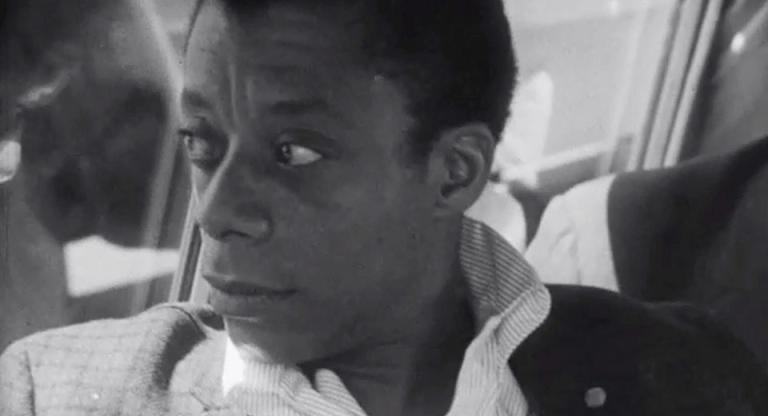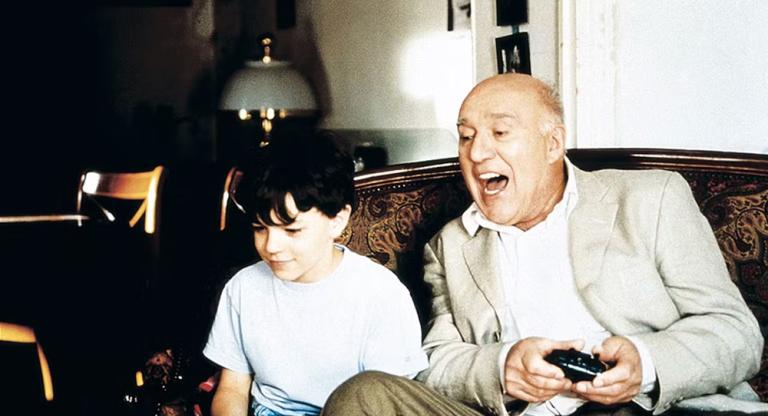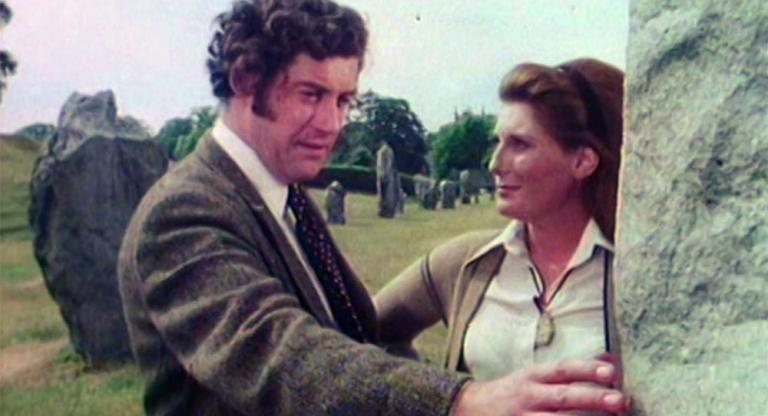In Sedat Pakay’s James Baldwin: From Another Place (1973), the writer is filmed ambling through an Istanbul bazaar, pausing to peruse a selection of Turkish-language books on the street. He picks out one of his own: Kara Yabanci [Dark Stranger], the Turkish translation of Another Country, its dark cover conspicuously contrasting the uniformly white and gray covers on display. He crouches to inspect a stack of books and extracts another. Barely enough time is given to register the title—The FBI Story—before the film abruptly cuts to an open magazine in his apartment, displaying the photos and names of Black Panthers who have been murdered. At this unassuming bookstand, the essence of Baldwin’s little-known Turkish decade can be grasped. In this distant locale, where his differences meant something different, Baldwin found a space to think more clearly (and personally, especially concerning his sexuality) about the conditions that made it intolerable to write from home.
Pakay’s film screens as part of “James Baldwin Abroad,” a program which explores the writer’s expatriate sojourns. Preserved by the Yale Film Archive in 2021, it is likely the most rarely seen of the three films. Terence Dixon’s Meeting the Man: James Baldwin in Paris (1970), on the other hand, is by far the most widely seen, owing to its availability on streaming services. It is also, in its treatment of Baldwin, the total opposite of From Another Place, which threads his uninterrupted voiceover through the film just as Baldwin threads himself through crowds of curious onlookers. Dixon allows his subject no such freedom of movement, cornering Baldwin with leading questions designed to fashion him into a writer of the “Black experience,” rather than engaging with his immediate presence. Baldwin takes advantage of the symbolic power of place to subvert this cooptation of his image. He leads the crew, along with a young Black student (possibly a draft dodger), to the Place de la Bastille, where the walls of the destroyed prison seem to reconstitute themselves in the bars of the fence ringing the July Column. They become, literally, the bars which define the edges of the frame that confine Baldwin to the filmmakers’ misrepresentations.
The most electrifying film in the program, Horace Ové’s provocatively-titled Baldwin’s N——r (1968), places Baldwin on unsteady ground, not because of white liberal naiveté, but through a clash of identities. Filmed at the West Indian Student Centre in London, it opens with a speech by Baldwin, an invited guest along with comedian Dick Gregory, which reveals the title’s meaning:
I tried to explain, you know. He said, ‘Don’t you care enough to find out?’ And I tried to explain that if I were originally from Dakar or from wherever I was from in Africa, I couldn’t find out where it was, because my entry into America is a bill of sale. And that stops you from going any further. At some point in our history, I became Baldwin’s n——r. That’s how I got my name. That really cannot be considered my fault. It can’t be considered the fault of the cat at the British Museum, either, that he doesn’t know that I can’t find that out.
Baldwin’s interlocutor in this anecdote, the “cat at the British Museum,” is in his account a West Indian man. This gap between Baldwin’s American framing of racial origin and segregation and his Caribbean audience is further drawn out in the Q&A following his speech. Rather than record the action in a prosaic, utilitarian manner, Ové effectively dramatizes the exchange of ideas. Nearly every time someone asks a question of Baldwin, the camera slowly zooms out from their face and pans, across the audience, back to Baldwin, emphasizing the mass of people standing and sitting between them, their postures at once admiring, skeptical, and curious.
The films in James Baldwin Abroad,” shot in Istanbul, Paris, or London, all convey Baldwin’s intense screen presence. But there is tenderness, too. From Another Place opens with some of the most intimate footage of Baldwin ever captured: he appears nearly nude as he gets out of bed and draws the curtains, letting in a patch of light. There is a sense of comfort and contentment in this foreign room that feels, strangely, very much like home. But perhaps this shouldn't be surprising. As Baldwin writes in Notes of a Native Son, he left America precisely to try to “[bring] to an end the alienation of the American from himself.”
“James Baldwin Abroad: A Program of 3 Films” screens tonight, January 6, and runs for a week at Film Forum.




